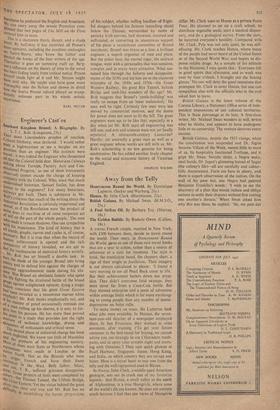Engineer's Castes
ambard Kingdom Brunel: A Biography. By L. T. C. Rolt. (Longmans, 25s.) 1.4AT stout Lincolnshire prophet of reaction, Colonel Sibthorp, once declared: 'I would rather meet a highwayman or see a burglar on my Premises than an engineer.' His instincts were sound : it was indeed the Engineer who threatened all that the Colonel held dear. Historians ('always talking about Turnips, Factory Acts and Con- stitutional Progress,' as one of them irreverently Observed) cannot escape the charge of keeping Company with the Colonel. Who, since that much undervalued historian, Samuel Smiles, has done iusilice to the engineers? For many historians, railways got built. There is substance in Mr. Aolt's criticism that much of the writing about the Industrial Revolution is curiously impersonal and unreal, as if the Revolution were 'the product of SoM e dens ex machina or of some corporate act th",will on the part of the whole people.' The men ""° made it remain shadows. One can sympathise with his impatience. The kind of history that is all trends, graphs, curves and cycles is, of course, B.heu_eessarY. But it is true that when the record of oman achievement is opened and the rich feel the inadequacies of statistical history acutely. 1,, Mr. Rolt has set himself a double task: to reality the shade of the younger Brunel into living n'antY and to defend him against the charges of i:enr,s°flal aggrandisement made during his life- ',.e,,as Brunel an obstinate fanatic who spent ga-h"Le fighting the irrational battle of the broad faiT8e against enlightened opinion, dying a tragic hadur:e conscious that his giant Great Eastern eietZeen revealed as a monstrous marine white if (;,•"ant? Mr. Rolt thinks emphatically not, and of a's manner of proof occasionally reminds one • rnan rolling up his sleeves, it is easy to for- give hi_ his nn.'" his passion. He has more than proved mix,r-int in a study that provides just the right elo ,ure ut technical knowledge, drama .and 19htlence, of enthusiasm and critical sense. innehe second phase of industrial change has been and neglected. We know too little of Maudslay mosttne products of his engineering nursery. them rePut of were Scots or Northerners whose native were made in London or the b, 'e North. Not so the Brunels who were raJe . ,1 French and have their finest and GNI :_ Jo the West. Both father, Marc, ment.S", 1. K., suffered grievous disappoint- other, Great projects of both were completed by the -the Thames Tunnel, the Clifton Bridge, plans Great Eastern. Yet the vision behind the great dillicur as clear and true and Bolt has no 'Y in establishing the heroic proportions of his subject, whether toiling heedless of fright- ful dangers behind his famous tunnelling shield below the Thames, surrounded by mobs of panicky Irish navvies, half drowned, maimed and suffocated, or converting to unanimous support of his plans a recalcitrant committee of Bristol merchants. Brunel was brave as a lion, a brilliant engineer, a superb organiser of men and plans. But the poker face, the eternal cigar, the satirical tongue, went with a personality that was sensitive, complex and in many ways attractive. What sus- tained him through the failures and disappoint- ments of the 1830s and led him on to the clustered triumphs of the 1840s and 1850s—the Great Western Railway, the great Box Tunnel, Saltash Bridge and such-like wonders of the age? Mr. Rolt suggests that Brunel's 'castle-building' was really an escape from an 'inner melancholy.' He may well be right. Certainly few men were less moved by commercial motives, and the desire for power does not seem to fit the bill. The great engineers were apt to be like that, especially in a day when (as Mr. Rolt says) all engineering was
still one, and arts and sciences were not yet finally separated. A nineteenth-century Leonardo?
Hardly; yet assuredly a great man as well as a great engineer whose works are still with us. Mr. Rolt's scholarship is no less genuine for being unobtrusive. He has added another lively chapter to the social and economic history of Victorian England.
CHARLES WILSON














































 Previous page
Previous page